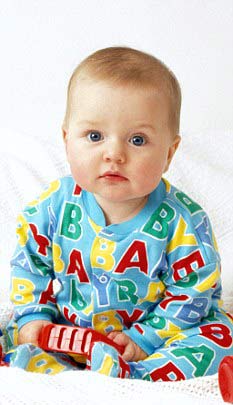|
 The vocabulary of babies who are bilingual remains flexible as they grow up (Library image) |
|
The vocabulary of babies who are bilingual remains flexible as they grow up and boosts their speaking ability as toddlers, a university study has found. Babies and children have a great ability to learn a second language but that begins to fade as early as their first birthdays. Now researchers at the University of Washington's Institute for Learning & Brain Sciences are investigating the brain mechanisms that contribute to infants' prowess at learning languages, with the hope that the findings could boost bilingualism in adults, too. In the research, the scientists report that the brains of babies raised in bilingual households show a longer period of being flexible to different languages, especially if they hear a lot of language at home. The researchers also show that the relative amount of each language - English and Spanish - babies were exposed to affected their vocabulary as toddlers. The study, published in Journal of Phonetics, is the first to measure brain activity throughout infancy and relate it to language exposure and speaking ability. 'The bilingual brain is fascinating because it reflects humans' abilities for flexible thinking - bilingual babies learn that objects and events in the world have two names, and flexibly switch between these labels, giving the brain lots of good exercise,' said Patricia Kuhl, co-author of the study and co-director of the UW's Institute for Learning & Brain Sciences. Kuhl's previous studies show that between 8 and 10 months of age, monolingual babies become increasingly able to distinguish speech sounds of their native language, while at the same time their ability to distinguish sounds from a foreign language declines. For instance, between 8 and 10 months of age babies exposed to English become better at detecting the difference between 'r' and 'l' sounds, which are prevalent in the English language. This is the same age when Japanese babies, who are not exposed to as many 'r' and 'l' sounds, decline in their ability to detect them. (Read by Christine Mallari. Christine Mallari is a journalist at the China Daily Website.) (Agencies) |
一项大学研究发现,接受双语教育的宝宝在成长过程中可以灵活地掌握两门语言的词汇,而且学步时期的口语表达能力也能有所提高。 婴儿和儿童在学习第二门语言方面能力很强,但早在他们过第一个生日的时候,这种能力就开始逐渐退化。 目前,华盛顿大学学习与脑科学研究所的研究人员们在对促进婴儿非凡的语言能力的大脑机制进行研究,他们希望研究结果也可以推动成人的双语教育。 在研究中,科学家们报告说,成长在双语家庭中、特别是在家能听到大量语言交流的宝宝的大脑表现出更长时间的对不同语言的灵敏度。 研究者们还揭示说,在婴儿时期接触到的各种语言(英语或西班牙语)的数量,会影响到他们学步时期的词汇量。 这项发表在《语音学期刊》上的研究第一次对婴儿时期的大脑活动进行测量,并将其与语言环境和口语能力联系起来。 帕特丽夏•库尔是该研究的合著者之一,也是华盛顿大学学习与大脑科学研究所的副主任,她说:“双语大脑很棒,因为它可以反映出人类灵活思维的能力。双语宝宝们认识到世界上的物体和事件都有两个名称,并能在不同的名称之间灵活转换,这给了大脑很多有益的锻炼。” 库尔之前的研究显示,只接触一种语言的宝宝在8个月到10个月大的时候分辨母语语音方面能力会日益增强,但与此同时,分辨外语语音的能力却减弱了。 比方说,接触英语的宝宝们在8个月至10个月大的时候会更容易分辨r和l两个音的区别,而这两个音在英语中很普遍。 而同年龄的日本宝宝们没有接触到那么多的r和l,所以他们分辨出这两个音的能力也在下降。 相关阅读 (中国日报网英语点津 实习生沈清 编辑:陈丹妮) |
|
Vocabulary: prowess: 非凡的能力;高超的本领 label: 称号 prevalent: 普遍的 |
